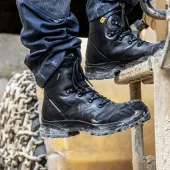Future-focused debate on health and safety

Highlights of the British Safety Council’s annual conference – ‘Health and Safety – What’s Next?’
Delegates heard from experts at the top of their respective fields in health and safety at The British Safety Council’s annual conference ‘Health and Safety – What’s Next?’ on Wednesday 23 September in London.
Bringing together stakeholders from every discipline within the industry, it was a chance to exchange knowledge and gain a window into the future of health and safety.
Statistics were perhaps the starkest demonstration of the challenges the future presents. The Health and Safety Executive’s director of general regulation, Kevin Myers, explained that while the UK remains one of the safest places to work in Europe, having the lowest rates of worker fatalities, there are 13,000 people dying each year from work-related illness.
However, while there are challenges on the horizon, speakers showed the way is now open for solutions proposed. ‘We’re now at a point where the Government is starting to listen and where we can expect to create positive change for health and well-being in the workplace,’ said Professor Stephen Bevan, who heads the Health at Work Policy Unit at The Work Foundation. ‘I think there’s a fantastic opportunity for joining [disciplines in health and safety and well-being] for mutual advantage.’
In politics and legislation, speakers pointed to major shifts in Parliament and the courts. Mike Clancy, general secretary of Prospect, warned that the Trade Union Bill currently before Parliament, and which proposes to get rid of the auto-subscription mechanism for membership, would have a detrimental effect on the quality of health and safety in organizations.
‘When unions are having to devote attention to ways of regaining their customers, they won’t be engaging on the constructive agendas for change, for good organizational design, for good jobs and safe work places – they will be surviving,’ he warned.
Ahead of new sentencing guidelines for health and safety and corporate manslaughter offences set to come into force in January, a panel of legal and health and safety experts, preceded by the opening speech from Dr Simon Joyston-Bechal, a director with Turnstone Law, discussed the likely scope of fines and prison sentencing to come.
Dr Joyston-Bechal said most clients were not aware of them and predicted a ‘massive dawning’ of realization. ‘Unless these guidelines are radically changed, we’re going to [see] judges led to very big sentences when they wouldn’t have otherwise done so,’ he commented.
Delegates also heard from speakers including: Steve Hails, health and safety director at Crossrail; Mike Slater, past president of the British Occupational Hygiene Society (BOHS), who talked of the ongoing relevance of the Breathe Freely campaign as over 500 construction workers are believed to die each year from silicosis; and Glen Davies, programme manager - freight and fleet with Transport for London, who introduced new schemes for better safety on the roads from a ‘star rating’ mechanism for lorries (FORS) to the Safer Lorry scheme which launched earlier this month.
The event concluded with a closing keynote from Geoffrey Podger, who said if the UK leaves the EU, it could still be required to mirror EU safety rules as part of the existing free-trade deal.









